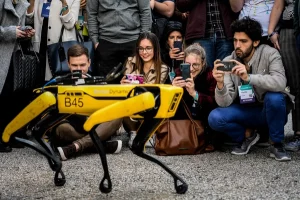
Boston Dynamics as well as five other robotics companies recently signed an open letter promising not to weaponize general-purpose robots— a much needed relief to the public.
Agility Robotics, ANYbotics, Clearpath Robotics, Open Robotics, Unitree, and Boston Dynamics—the six leading robotics firms— stated that highly advanced robots could be hugely beneficial in our home and work lives, but there is also a possibility that they could be used for malicious purposes.
‘Untrustworthy people could use them to invade civil rights or to threaten, harm, or intimidate others,’ said the companies.
‘We believe that adding weapons to robots that are remotely or autonomously operated, widely available to the public, and capable of navigating to previously inaccessible locations where people live and work, raises new risks of harm and serious ethical issues,’ they stated.
The firms made a pledge not to weaponize their ‘advanced-mobility general-purpose robots’ or their operating software. They also promised to make sure customers didn’t weaponize the products.
The companies however stated that they have no issues with ‘existing technologies’ governments use to ‘defend themselves and uphold their laws.’
Boston Dynamics’ website states that fire and police departments use the company’s dog-like robot ‘Spot’ to make assessments of risky situations, but the firm stated that Spot was not designed for the purpose of surveillance or to replace police officers.
Agitation has been growing globally to curb the use of autonomous weapon systems. The ‘Stop Killer Robots’ campaign says that almost 100 countries and majority of the people are against the use of autonomous weapons.
Last year, a meeting of the United Nations Convention on Certain Conventional Weapons failed to reach an agreement on the use of the ‘killer robots’. This is partly because of the objections from countries currently developing such technologies such as Russia, the U.S., and the UK.
By Marvellous Iwendi.
Source: npr